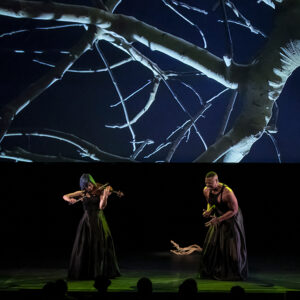Jennifer Koh & Davóne Tines Premiere ‘Everything Rises’

When violinist Jennifer Koh and bass-baritone Davóne Tines’s paths crossed, they saw in each other an ally struggling with the same issue: being an artist of color in a culture dominated by whiteness. Everything Rises is a record and artistic product of that mutual encounter, and their collective exploration leads them to their family histories, sharing stories of Jennifer’s mother Gertrude Soonja Lee Koh’s experiences of the Korean War and immigration to the U.S., as well as Davóne’s grandmother Alma Lee Gibbs Tines’s memories of anti-Black discrimination and violence. Over the span of the numerous years that Everything Rises has been in development, there has been a new surge of activism against racist violence targeting Black and Asian Americans. Inspired by the recent outpouring of support and solidarity across racial identities, the work proposes a united front through music. Everything Rises is an original evening-long staged musical work about connection and resonance. Jennifer Koh and Davóne Tines use music, projections, and actual interview recordings to tell the store of their artistic journeys and family histories. While they have been forced to “code-switch” to operate within the predominantly white institutions of classical music, they discover a more authentic sense of self by diving into their family histories. This project was developed over multiple years by an all-BIPOC creative team and received its world premiere in April 2022 at UC Santa Barbara Arts & Lectures.
CRITICAL ACCLAIM
“By deftly weaving together first-person video and audio from their ancestors with blunt lyrics and powerful music in songs like “A Story of the Moth” and “Alma’s Song,” Koh and Tines stripped away the convention of polite distance between performers and their audience. The refrain “dear white people” in “Moth” hit particularly hard, imbued with an acidic irony. ”
The Santa Barbara Independent
By the end, “Everything Rises” departs from the white-dominated space of the opening with the aim, Tines said, of “reclaiming agency.” He and Koh perform a duet about how they are connected, and how this project “allows us to see each other.” “It’s about creating a new space,” Koh said. “And hopefully what we’re doing in this work will open space for people of color to tell more truth. It’s everybody’s loss, including classical music, if stories from people that are not like us are not heard.”
The New York Times
“Every creative decision contributed to the formation of a safe stage for marginalized artists–the lighting accentuated the innate beauty of the performer’s bodies; the matching floor-length, loose black dresses afforded the performers the freedom to move in space and into authenticity…Everything Rises is a bold reminder that art and music is not immune to the power dynamics and patterns of oppression present across society, and that great art can empower marginalized voices to speak, or rather, to sing their truth. Projects as emotional and personal as this one are taxing to both the performers and the audience. However, the alternative– projects that stifle one’s identity to appeal to a faceless crowd or pretend everything is fine when it’s not–is not one that anyone should be subjected to. Koh and Tines masterfully demonstrate that it is possible to reject this alternative mode of performance, etching out a more compassionate, more authentic mode of sharing classical music.”
Asia Pacific Arts
“Everything Rises is a work of such originality and, at the same time, a so deeply personal exploration of identity by both Koh and Tines that it is challenging to describe…As classical performers, both live with the challenge of presenting as distinctive individuals while performing as part of a collective and under another’s direction. As persons of color in the classical world and in American society, they have succeeded at code switching – but at what cost? Everything Rises, which was developed with an all BIPOC creative team, represents a musical declaration of self, an acknowledgement of past and present racism, and hope for a better future…Perhaps the most haunting moment in the performance is when Tines performs “Strange Fruit” the Abe Meeropol-Milt Raskin song about lynching popularized by Billie Holiday. Koh plays fast and furious at first, angry discordant notes coalescing into careful accompaniment as Tines slowly intones the words of the song: “Black bodies hangin’ from the poplar trees…..” As Tines’ dirge-like declamation gathers strength, Koh’s playing becomes more lyrical – electronic beats fill in and Tines’ voice becomes sweeter describing “the fruit for the crows to pluck… the strange and bitter crop…. A strange and bitter cry.” And just as this beautiful song tells an awful truth, Koh and Tines’ acknowledgement carries with it a spirit of solidarity. Tines calls out to “the better angels of our nature” as Everything Rises ends on a note of uplift (literally and figuratively) as Koh and Tines sit beside each other on stage…it stands as an expression of two artists finding their voice. And in doing so, it makes one consider all that we suppress in order to pass personally and professionally in the world.”
Forbes
“Ken Ueno’s score is subtly chant-like, serving less to announce itself as to empower the performers on their effortful path to self-expression…What we first notice in Koh and Tines is their extraordinary communicability. Violin and voice speak with an eloquence and power worth knowing about.”
The Los Angeles Times
